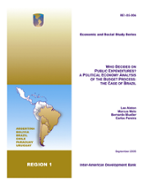Who Decides on Public Expenditures?: A Political Economy Analysis of the Budget Process: The Case of Brazil
Date
Sep 2005
In this project, the authors analyze the budgetary process to determine who decides on public expenditures in Brazil. The focus is not so much on the actual fiscal outcomes that emerge from the budgetary process, but rather on the policy making process that generates those outcomes. This involves looking not only at the budgetary rules and institutions but also at the political institutions that determine the players involved, their motivations, their incentives, and their power. In essence: who can initiate proposals that affect the budget and spending, who can vote, who can veto, and what is the sequence in which these actions take place? The political institutions set the formal and informal rules under which these players interact, that is, the policy making game. The final outcomes from this game will vary over time as they are affected as well by economic and political shocks. Representative outcomes are those that mirror the preferences of society rather than those of specific groups. Outcomes are sustainable when they can be replicated over time without resulting in economic crises. In this project we describe the characteristics of budgetary outcomes in Brazil in terms of these criteria by showing how those outcomes map into the country's political institutions. The paper concludes by examining several reforms to the budgetary process in Brazil that have been proposed by politicians and academics and the authors' own policy recommendations.



